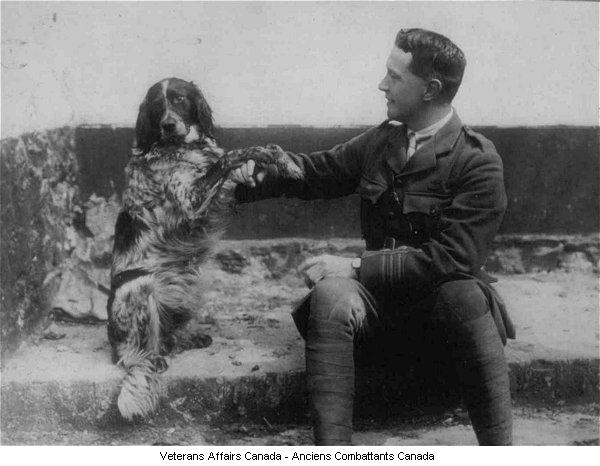The gentle physician, poet and artist from Guelph, Ont., was an experienced soldier when he met his death overseas. He had served during the Boer War, but nothing could prepare him, or anyone, for the horrors of the battles of the First World War.
McCrae with his dog Bonneau, in France, courtesy Veterans Affairs Canada www.veterans.gc.ca
He wrote In Flanders Fields, perhaps the best known poem of the First World War, in 1915 after his close friend Alexis Helmer was killed in the Second Battle of Ypres, one of 6,000 Canadian casualties in just two days. In a letter to his mother he described the battle as a nightmare. “For seventeen days and seventeen nights none of us have had our clothes off, nor our boots even, except occasionally. In all that time while I was awake, gunfire and rifle fire never ceased for sixty seconds ….. And behind it all was the constant background of the sights of the dead, the wounded, the maimed, and a terrible anxiety lest the line should give way.”
A brief biography can be found on the Veterans Affairs Canada website, and a video biography here.
The Queen’s Choral Ensemble performs it A Cappella, while Willard Bond does it in performance art. We can thank SilverEndScouts for this video recitation.
And for those who prefer the printed word:
In Flanders fields the poppies blow
Between the crosses, row on row,
That mark our place; and in the sky
The larks, still bravely singing, fly
Scarce heard amid the guns below.
We are the Dead. Short days ago
We lived, felt dawn, saw sunset glow,
Loved, and were loved, and now we lie
In Flanders fields.
Take up our quarrel with the foe:
To you from failing hands we throw
The torch; be yours to hold it high.
If ye break faith with us who die
We shall not sleep, though poppies grow
In Flanders fields.
– John McCrae
Advertisement






















